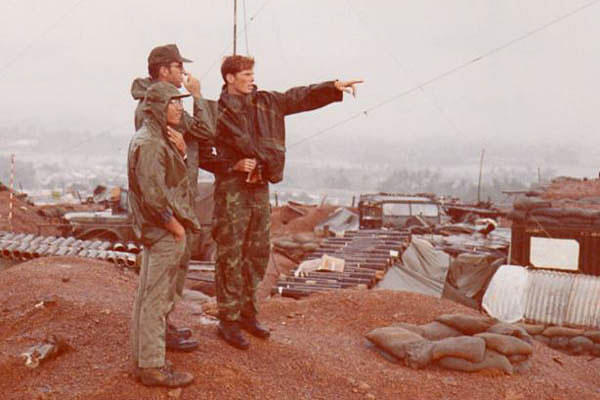LOUISVILLE, Ky. -- The Veterans of Foreign Wars national membership on Monday approved a resolution supporting congressional action to award the Medal of Honor to a retired Army officer for heroic actions in Vietnam 41 years ago.
Then-Maj. William Collier was one of just two Americans and 120 South Vietnamese troops at the Duc District Headquarters in Quang Ngai Province when it was attacked Sept. 16, 1972, by up to 1,000 North Vietnam Army soldiers.
The battle -- which two eyewitnesses called “Maj. Collier’s Alamo” -- lasted 54 hours and left only Collier and 21 ARVN soldiers alive. Staff Sgt. Carroll Jackson, the only other American at the headquarters, was killed in the fighting.
Collier, who retired as a colonel, was awarded the Silver Star for his leadership and bravery, though there has long been a belief his actions were worthy of the nation’s highest honor, said Joe Davis, spokesman for the VFW.
The VFW’s National Security and Foreign Affairs Committee on Sunday easily passed the resolution that was approved on Monday by members gathered this week in Louisville for the organization’s annual convention.
Collier was the senior American adviser at the Mo Duc District Headquarters when the NVA force hit the base on Sept. 16 and continued the attack until Sept. 18. At times, the fighting was hand-to-hand as Collier led the ground defense and coordinated with air, artillery and naval gunfire support to keep the base from falling.
Collier told Military.com in a telephone interview on Monday that he never really spoke to anyone about the battle outside his family. But he finally spoke about it with members of a Combat Veterans Support Group organized by his church, he said.
After that, he dug out an old tape -- made 40 years earlier on a reel-to-reel recorder in Saigon, where he had flown for a debriefing about the battle. The tape was not in good shape and so he had it cleaned up and digitized onto a CD.
“I played it on a CD” for the veterans’ church, he said. “When it was done, they all just looked at me. I said, ‘What’s wrong?’ And they said, ‘All you got was a Silver Star?' "
After that, he said, other veterans, in particular retired Marine Col. Steven Vitali, began looking into the possibility of recommending him for the Medal of Honor.
Vitali told Military.com that the documents supporting the nomination arevalready in the hands of Sen. Lindsey Graham, R-S.C., who is expected to bring the recommendation to the Senate.
Collier’s citation for the Silver Star, which was awarded on Nov. 3, 1972, states the base was hit by up to 2,000 rounds of enemy rocket, mortar and artillery fire and numerous ground assaults. At times, he called in friendly air burst artillery on the base to keep it from being overrun by the NVA forces. During the fight, he was knocked from his feet four times as he regularly exposed himself to enemy fire to coordinate the defense.
Retired Air Force Capts. Joseph Personett and Richard Polling, forward air controllers whose actions flying OV-10 Bronco light attack and observer planes in support of the battle earned them both the Air Force Cross, referred to Mo Duc as “Major Collier’s Alamo” in statements they gave supporting the Medal of Honor.
“If you could see what I see and feel what I feel whenever I remember that day, then you too would know in an instant and without any hesitation why I believe that William Collier deserves the Medal of Honor,” Personett wrote in a statement dated March 26, 2013.
Polling, in his statement, said the successful defense of Mo Duc “was dependent on [Collier] alone. He continuously exposed himself to withering enemy fire in order to coordinate and direct friendly ground artillery, naval gunfire, air power and his own force’s limited defensive weaponry. … Had [he] become disabled or killed, the entire rescue operation would most certainly have failed.”
Vitali said the Alamo is one battle to which Mo Duc might easily be compared, but believes it is more like the famous Jan. 22, 1879, Battle of Rorke’s Drift in South Africa. Like the small British garrison of 139 men attacked by several thousand Zulu warriors, Collier and his ARVN troops held their base, he said.
Vitali said the battle of Mo Duc was a severe defeat for the NVA, but that the U.S. kept discussion of it to a minimum so it would not jeopardize the peace talks that were then underway.
“Today, the Mo Duc Battle and the significant rescue operation that grew from it is a story of military history that our public should know about,” he said.
Collier is grateful for the efforts of Vitali, Polling, Personett and other veterans who have made the effort to have him considered for the Medal of Honor. But he also keeps it in perspective.
When the battle was over and he was still alive, he said, “I was a happy camper.”
“I guess it’s been a good thing. Regardless of whatever comes of this. At least my kids and grandkids will have a good idea of what happened in Vietnam,” he said.


























